Ford Puma vs Jaguar I-Pace – Differences & prices compared
Compare performance, boot space, consumption and price in one view.
Find out now: which car is the better choice for you – Ford Puma or Jaguar I-Pace?
The Ford Puma (SUV) comes with a Petrol MHEV or Electric engine and Manuel or Automatic transmission. In comparison, the Jaguar I-Pace (SUV) features a Electric engine with Automatic transmission.
When it comes to boot capacity, the Ford Puma offers 523 L, while the Jaguar I-Pace provides 638 L – depending on how much space you need. If you’re looking for more power, decide whether the 168 HP of the Ford Puma or the 400 HP of the Jaguar I-Pace suits your needs better.
In terms of consumption, the values are 13.10 kWh5.40 L per 100 km for the Ford Puma, and 25.20 kWh for the Jaguar I-Pace.
Price-wise, the Ford Puma starts at 24800 £, while the Jaguar I-Pace is available from 79200 £. Compare all the details and find out which model fits your lifestyle best!
Ford Puma
The Ford Puma presents itself as a stylish compact SUV with a distinctive design that combines practicality with a dynamic driving experience. Its sleek lines and sporty aesthetics make it stand out on the road, while the interior offers a comfortable and tech-savvy environment. With an emphasis on efficiency and a smooth drive, the Ford Puma is well-suited for both urban commutes and countryside adventures.
details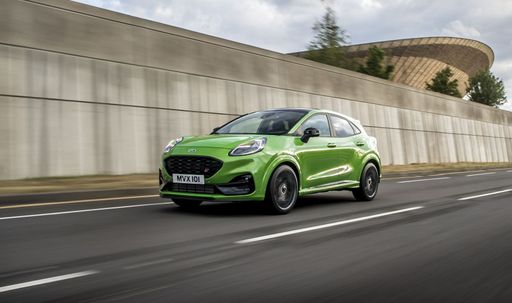 @ puma.fordpresskits.com
@ puma.fordpresskits.com
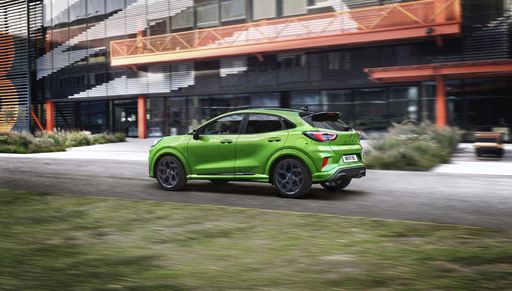 @ puma.fordpresskits.com
@ puma.fordpresskits.com
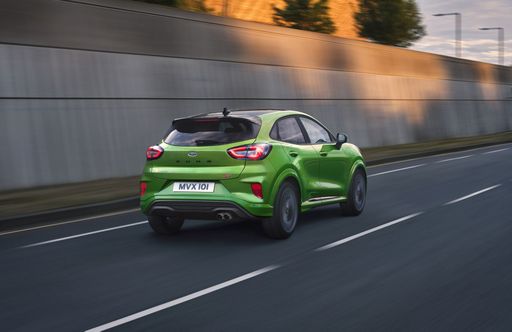 @ puma.fordpresskits.com
@ puma.fordpresskits.com
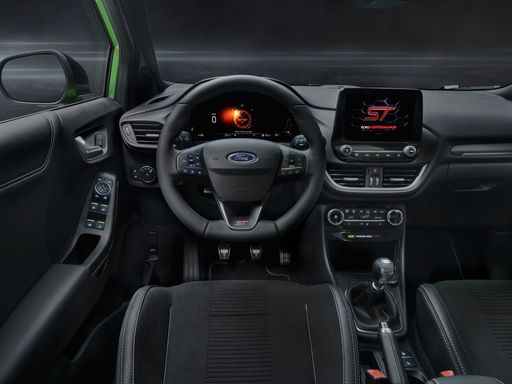 @ puma.fordpresskits.com
@ puma.fordpresskits.com
Jaguar I-Pace
The Jaguar I-Pace represents a remarkable fusion of cutting-edge electric performance and iconic British luxury. With its sleek design and spacious interior, this model redefines what one can expect from an electric vehicle in terms of style and comfort. Its impressive driving dynamics and advanced technology make it a standout choice for those looking to make a statement on the road.
details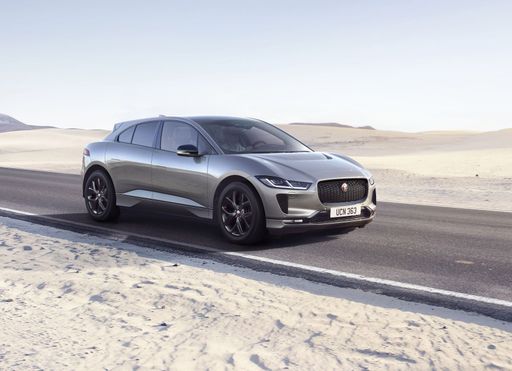 @ media.jaguar.com
@ media.jaguar.com
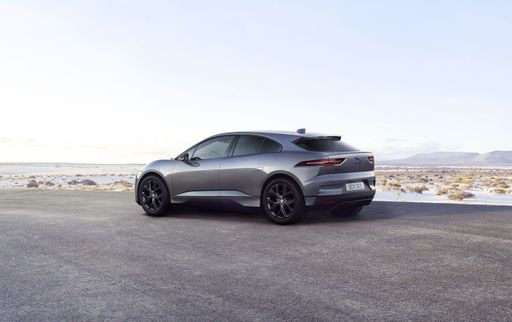 @ media.jaguar.com
@ media.jaguar.com
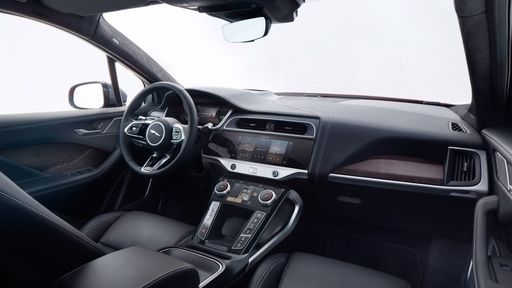 @ media.jaguar.com
@ media.jaguar.com

|

|
|
|
|
Costs and Consumption |
|
|---|---|
|
Price
24800 - 36300 £
|
Price
79200 - 85500 £
|
|
Consumption L/100km
5.4 - 6 L
|
Consumption L/100km
-
|
|
Consumption kWh/100km
13.1 - 13.7 kWh
|
Consumption kWh/100km
25.20 kWh
|
|
Electric Range
364 - 376 km
|
Electric Range
469 km
|
|
Battery Capacity
43 kWh
|
Battery Capacity
84.70 kWh
|
|
co2
0 - 136 g/km
|
co2
0 g/km
|
|
Fuel tank capacity
42 L
|
Fuel tank capacity
-
|
Dimensions and Body |
|
|---|---|
|
Body Type
SUV
|
Body Type
SUV
|
|
Seats
5
|
Seats
5
|
|
Doors
5
|
Doors
5
|
|
Curb weight
1316 - 1563 kg
|
Curb weight
2226 kg
|
|
Trunk capacity
456 - 523 L
|
Trunk capacity
638 L
|
|
Length
4186 - 4226 mm
|
Length
4682 mm
|
|
Width
1805 mm
|
Width
2011 mm
|
|
Height
1550 - 1555 mm
|
Height
1566 mm
|
|
Payload
367 - 469 kg
|
Payload
444 kg
|
Engine and Performance |
|
|---|---|
|
Engine Type
Petrol MHEV, Electric
|
Engine Type
Electric
|
|
Transmission
Manuel, Automatic
|
Transmission
Automatic
|
|
Transmission Detail
Manual Gearbox, Dual-Clutch Automatic, Reduction Gearbox
|
Transmission Detail
Reduction Gearbox
|
|
Drive Type
Front-Wheel Drive
|
Drive Type
All-Wheel Drive
|
|
Power HP
125 - 168 HP
|
Power HP
400 HP
|
|
Acceleration 0-100km/h
7.4 - 9.8 s
|
Acceleration 0-100km/h
4.80 s
|
|
Max Speed
160 - 210 km/h
|
Max Speed
200 km/h
|
|
Torque
170 - 290 Nm
|
Torque
696 Nm
|
|
Number of Cylinders
3
|
Number of Cylinders
-
|
|
Power kW
92 - 124 kW
|
Power kW
294 kW
|
|
Engine capacity
999 cm3
|
Engine capacity
-
|
General |
|
|---|---|
|
Model Year
2024 - 2025
|
Model Year
2023
|
|
CO2 Efficiency Class
D, E, A
|
CO2 Efficiency Class
A
|
|
Brand
Ford
|
Brand
Jaguar
|
Ford Puma
A Glimpse into the Ford Puma: Fusing Style with Innovation
The Ford Puma stands as a testament to modern engineering fused with style. This compact SUV is not just about aesthetics but brings to the table an array of technical innovations, topped with the reliability and performance Ford is known for. Let's delve into the technical specifics and innovative features that make the Ford Puma a stellar choice for any car enthusiast.
Powertrains and Performance
The Ford Puma is offered with a range of powertrains designed to deliver optimal performance whilst minimising fuel consumption. At the heart of this compact SUV is the 1.0 EcoBoost Hybrid engine, available in both 125 PS and 155 PS variants. This engine is a marvel of engineering, optimised to deliver power efficiently with a remarkable fuel consumption ranging from 5.4 to 5.7 L/100km for manual versions, and slightly higher for the automated variants.
The top-end 1.5 EcoBoost ST variant takes performance up a notch, providing a robust 200 PS that propels the Puma from 0 to 100 km/h in just 6.7 seconds. This variant is perfect for those who prioritise performance and exhilaration in their driving experience.
Mild-Hybrid Technology
The Puma's mild-hybrid technology plays a significant role in enhancing fuel efficiency and reducing emissions. By utilising a belt-driven integrated starter/generator, the Puma recovers energy usually lost during braking, storing it in a 48-volt lithium-ion battery. This stored energy is then used to assist the engine, providing a boost during acceleration and smoothing out the stop-start technology, ultimately leading to enhanced fuel efficiency.
Design and Comfort
The Ford Puma does not compromise on style and comfort with its ergonomic and stylish design. The SUV is available in multiple trims including the ST-Line, Titanium, and the luxurious Vignale editions, each offering unique aesthetic and technological enhancements. These trim levels provide varied offerings in terms of both exterior styling and interior comfort, ensuring there's a Puma that meets every personal preference.
Inside, the Puma offers a driver-focused cockpit with advanced technological integrations such as the SYNC 3 infotainment system, providing seamless connectivity and intuitive control of the vehicle's numerous technological features.
Safety and Technology
Safety remains paramount, and the Ford Puma is equipped with the latest security and technology features. It boasts the Ford Co-Pilot360 suite which includes adaptive cruise control, pre-collision assist with autonomous emergency braking, and lane-keeping assist, enabling a safer driving experience on both city roads and highways.
Versatility and Practicality
Beyond performance and safety, the Ford Puma shines in its versatility. With a boot capacity of 456 litres, it offers ample space for all sorts of adventures, whether you're heading on a family trip or loading sports equipment. Its innovative MegaBox is an extra storage solution, providing additional space below the boot floor.
The Puma's agile handling, paired with its compact dimensions—spanning a length of 4186 to 4266 mm and a width of 1805 mm—makes it an ideal choice for urban commuting and beyond.
Conclusion
In conclusion, the Ford Puma beautifully blends practical features with cutting-edge technology, offering a package that appeals to both the tech-savvy driver and those seeking comfort and reliability. Its range of innovative features, powerful yet efficient engine options, and a design that is both functional and stylish make it a frontrunner in the compact SUV market.
Whether you're drawn by the efficient mild-hybrid engines or the robust performance of the ST variant, the Ford Puma represents a modern driving experience where innovation meets everyday usability.
Jaguar I-Pace
Discovering Innovation: The Jaguar I-Pace
The Jaguar I-Pace represents a bold leap into the future of automotive design and engineering, blending luxury, performance, and sustainability into one stunning package. As Jaguar’s first all-electric model, the I-Pace not only showcases their commitment to innovation but also sets a new standard in the electric vehicle market.
A Powerhouse on Wheels
Under the sleek body of the Jaguar I-Pace lies an electric motor capable of delivering an impressive 400 PS (294 kW). This translates into an exhilarating driving experience, with the I-Pace accelerating from 0 to 100 km/h in just 4.8 seconds. The instant torque provided by the motor ensures unparalleled responsiveness, making every drive thrilling.
Efficient Performance
Despite its powerful performance, the Jaguar I-Pace is equally impressive in terms of efficiency. Boasting a consumption rate of just 25.2 kWh per 100 km and an electric range of up to 469 km, it’s clear that Jaguar has engineered this model to deliver uncompromised efficiency. With a noteworthy CO2 emission of 0 g/km, the I-Pace stands as a testament to the possibilities of sustainable luxury vehicles.
Advanced Engineering and All-Wheel Drive
The Jaguar I-Pace features an all-wheel-drive system, offering superior handling and stability, crucial for a vehicle with such performance credentials. The combination of dual electric motors and a sophisticated reduction gearbox enhances its prowess on the road, ensuring a smooth and responsive drive regardless of terrain.
A Design to Impress
One look at the Jaguar I-Pace, and its embodiment of modern elegance is unmistakable. With dimensions of 4682 mm in length, 2011 mm in width, and 1566 mm in height, this SUV is both spacious and stylish. The interior is equally inviting, with premium materials and high-tech features offering a luxurious driving experience for up to five passengers.
Technological Marvel
The I-Pace is packed with cutting-edge technology, from its intuitive infotainment system to its advanced safety features. The vehicle's aerodynamic design not only enhances its aesthetic appeal but also contributes to its efficiency and range, making it a marvel of modern engineering.
Sustainability Without Compromise
Jaguar positions the I-Pace as a trailblazer in eco-friendly driving, earning an A-class CO2 efficiency rating. It underscores a commitment to sustainability without compromising the luxury and performance that aficionados have come to expect from the Jaguar brand.
Conclusion
The Jaguar I-Pace is more than just an electric vehicle; it represents a future where performance, luxury, and sustainability coexist seamlessly. With its groundbreaking design and technology, the I-Pace not only captures the essence of Jaguar's rich heritage but also paves the way for the brand's journey into the electric era.
Which drive types are available for the Ford Puma?
Available as Front-Wheel Drive.
The prices and data displayed are estimates based on German list prices and may vary by country. This information is not legally binding.
